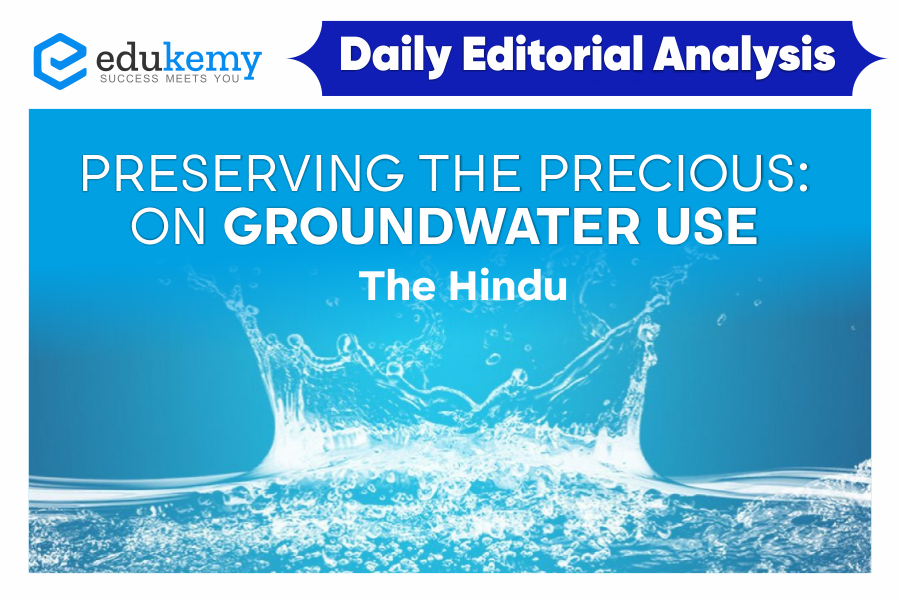
Preserving the precious resource of groundwater is a paramount concern that demands urgent attention. An article in The Hindu underscores the critical importance of responsible groundwater use in sustaining our ecosystems and meeting the burgeoning water needs of a growing population. As the world grapples with the challenges of climate change and increasing water scarcity, the piece advocates for a comprehensive approach to managing and conserving groundwater resources. It likely emphasizes the significance of community participation, efficient agricultural practices, and the implementation of stringent regulations to prevent over-extraction and contamination. The article from The Hindu likely serves as a call to action, urging policymakers, communities, and individuals to collectively adopt sustainable water management practices to ensure the longevity of this indispensable natural resource.
Contents
- 1 Exam View:
- 2 In News:
- 3 Government Initiatives Related to Groundwater Management:
- 4 Challenges to groundwater management:
- 5 Question for Practice:
- 6 Frequently Asked Questions (FAQs)
- 6.1 Q: Why is preserving groundwater important?
- 6.2 Q: How does excessive groundwater extraction impact the environment?
- 6.3 Q: What are the key measures for sustainable groundwater use?
- 6.4 Q: How can individuals contribute to preserving groundwater?
- 6.5 Q: What role does government policy play in groundwater preservation?
- 7 In case you still have your doubts, contact us on 9811333901.
Exam View:
Prelims:
Groundwater Depletion, Climate change, National Water Policy, 2012 Pradhan Mantri Krishi Sinchayee Yojana, Jal Shakti Abhiyan- Catch the Rain Campaign, Atal Bhujal Yojana, Green corridors, Drip and Sprinkler irrigation, Rainwater Harvesting.
Mains GS Paper I and II:
Current State of Groundwater Extraction in India, Issues Related to Groundwater Depletion, Current Government Initiatives Related to Groundwater Management.
In News:
Ministry of Water Resources recently made public a report that gives a snapshot of India’s groundwater situation.
The 2022 assessment of the Ministry of Water Resources suggests that groundwater extraction is the lowest since 2004. A decrease in groundwater extraction may indicate better water management, however, the report called the National Compilation on Dynamic Ground Water Resources of India also says that the improvement is only “marginal”.
India is home to 17% of the world’s population but only holds 4% of the world’s freshwater resources. Not only is water scarce in India, but the extraction of groundwater has been on the rise for decades. India is the world’s largest user of groundwater, where groundwater contributes to more than 60% of the country’s irrigation resources. After the “Green Revolution” to ensure food security, the demand for groundwater for agriculture has increased.
Government Initiatives Related to Groundwater Management:
- Har Khet ko Pani “Prime Minister Krishi Sinchayee Yojana”: The government of India is committed to accord high priority water conservation and its management. Improving water use efficiency ‘More crop per drop’ in a focused manner with an end-to-end solution on source creation, distribution, management, field application, and extension activities.
- National Water Policy, 2012: NWP was formulated to govern the planning and development of water resources and their optimum utilization.
- Jal Shakti Abhiyan- Catch the Rain Campaign: Catch the rain, where it falls, and when it falls and create Rainwater Harvesting Structures (RWHS) suitable for climatic conditions.
- Atal Bhujal Yojana: It envisages people’s participation through the formation of ‘Water User Associations’, water budgeting, preparation & implementation of Gram-panchayat-wise water security plans, etc.
Challenges to groundwater management:
- Water-intensive Crops in water deficit region: The minimum support price for wheat and rice creates highly skewed incentive structures in favor of wheat and paddy, which are water-intensive crops and depend heavily on groundwater for their growth. This makes groundwater a heavenly resource for their farming.

- Unregulated use of groundwater in agriculture: Several states affected by the depletion of groundwater provide free or heavily subsidized power (including solar pumps) for pumping groundwater for irrigated This enables overexploitation and depletion of scarce groundwater resources.
- Urbanisation and Population-related issues: Rising population and urbanization have increased the demand for water for domestic and industrial needs. limited surface water resources lead to the over-exploitation of groundwater resources.
- Sinking Water Table: Draughts, flash floods, and disrupted monsoon events are recent examples of climate change events that are placing pressure on India’s groundwater resources. And since, wells, ponds, and tanks are drying up as groundwater resources come under increasing pressure due to over-reliance and unsustainable consumption. This has escalated the water crisis.
- Ground-Water Regulation: The government of India regulates groundwater exploitation in water-stressed states through “notification” of highly overexploited blocks. However, only about 14% of the overexploited blocks in the country are currently notified.
Recently, A draft National Water Policy has recommended a shift in usage from water-guzzling crops and prioritizing recycled over freshwater for industrial purposes. Water ought not to be considered a free, private resource but one whose costs must be measured and borne equitably. There is a need to form a consensus across the political spectrum on disincentivizing the wasteful consumption of this precious resource.
Question for Practice:
Prelims:
With reference to ‘Water Credit’, consider the following statements: (2021)
- It puts microfinance tools to work in the water and sanitation sector.
- It is a global initiative launched under the aegis of the World Health Organization and the World Bank.
- It aims to enable poor people to meet their water needs without depending on subsidies.
Which of the statements given above are correct?
(a) 1 and 2 only
(b) 2 and 3 only
(c) 1 and 3 only
(d) 1, 2 and 3
Ans: (c)
Mains:
- Suggest measures to improve water storage and irrigation systems to make its judicious use under the depleting scenario. (2020)
- What are the salient features of the Jal Shakti Abhiyan launched by the Government of India for water conservation and water security? (2020)
Daily Newsletter – Get all your Current Affairs Covered – Click Here
Frequently Asked Questions (FAQs)
Q: Why is preserving groundwater important?
A: Groundwater is a vital source of drinking water and irrigation for millions of people. Preserving it ensures sustainable access to clean water and supports agriculture, making it crucial for the well-being of communities.
Q: How does excessive groundwater extraction impact the environment?
A: Over-extraction can lead to groundwater depletion, causing land subsidence, saltwater intrusion, and the drying up of wells. This disrupts ecosystems, harms biodiversity, and poses long-term threats to the balance of natural habitats.
Q: What are the key measures for sustainable groundwater use?
A: Sustainable groundwater use involves implementing efficient irrigation practices, recharging aquifers through rainwater harvesting, and promoting water conservation awareness. Regulation and monitoring of groundwater extraction also play a crucial role in ensuring long-term sustainability.
Q: How can individuals contribute to preserving groundwater?
A: Individuals can contribute by adopting water-efficient practices at home, fixing leaks, using rainwater harvesting systems, and minimizing unnecessary water consumption. These actions collectively help reduce the demand on groundwater resources.
Q: What role does government policy play in groundwater preservation?
A: Government policies are instrumental in regulating groundwater extraction, implementing water conservation programs, and promoting sustainable agricultural practices. Policies that encourage the recharge of aquifers and penalize over-extraction are essential for effective groundwater preservation at a larger scale.
In case you still have your doubts, contact us on 9811333901.
For UPSC Prelims Resources, Click here
For Daily Updates and Study Material:
Join our Telegram Channel – Edukemy for IAS
- 1. Learn through Videos – here
- 2. Be Exam Ready by Practicing Daily MCQs – here
- 3. Daily Newsletter – Get all your Current Affairs Covered – here
- 4. Mains Answer Writing Practice – here


